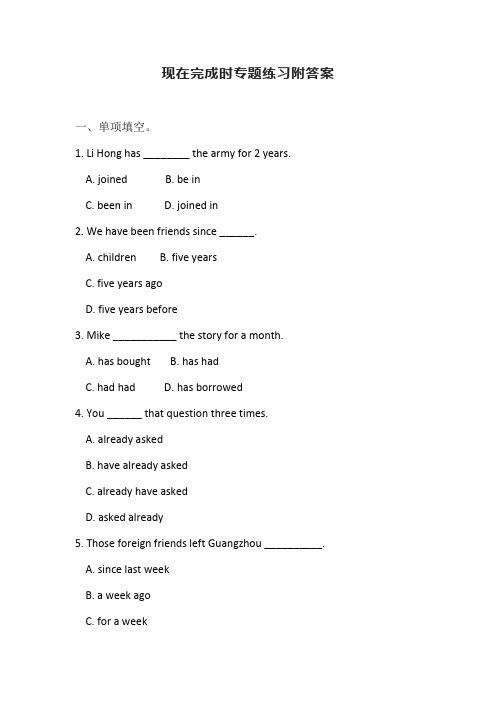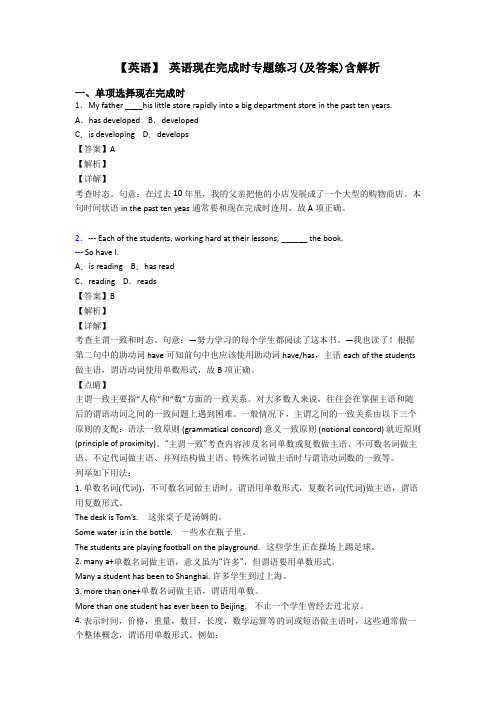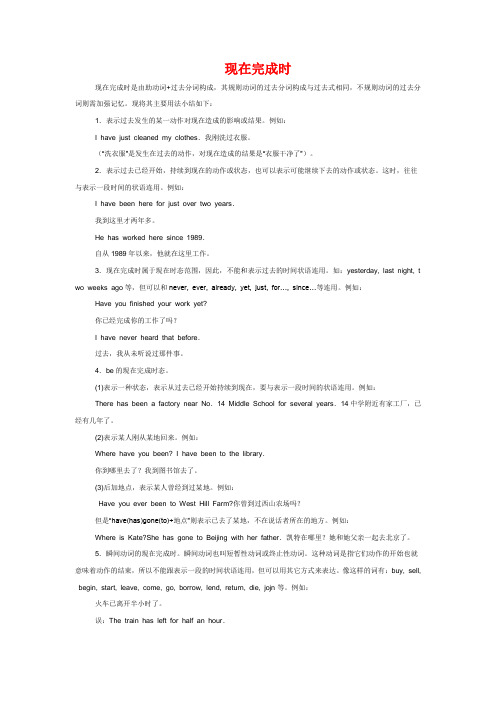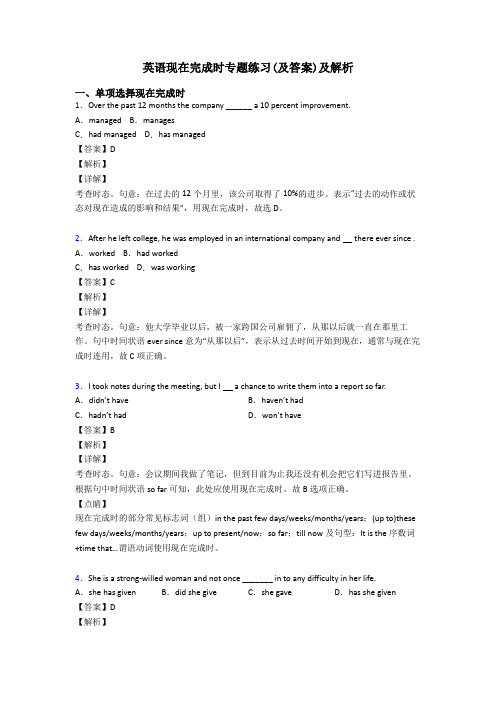现在完成时专题
小学语法专题解析:现在完成时常考题

小学语法专题解析:现在完成时常考题1.—Where is Tommy?—He ____ the teachers' office.A.has been to B.has gone to C.goes D.went解析:go去,A:曾经去过某地,现在已经回来了;B:已经去了某地,还没回来;C:动词单三形式;D:过去式。
汤米目前不在说话的地方,而是去了另一个地方还没回来。
故答案为B。
2.I've ____ a chocolate cake ____my little son.A.brought; for B.brought; fromC.bought; to D.bought; for解析:brought带来,bring的过去分词;bought买,buy的过去分词;for为了;from从;to到。
buy sth. for sb.为某人买某物,事件发生在过去,动词用过去式。
故选D。
3.Sanya is a beautiful city. I ____ there twice.A.have gone B.have beenC.have gone to D.have been to解析:我去过那里两次。
A:已经去了;B:去过;C:已经去了(后面需加地点名词);D:去过(后面需加地点名词)。
根据句意,可知我去过两次,现在已经回来了。
所以用have been。
又因为地点副词there前不需要加介词to,故答案为B。
4.Jack____ Nanjing many times and he knows a lot about the city.A.was B.been C.is D.has been to解析:is是,A.be动词过去式;B动词过去分词;C.be动词;D用于现在完成时,表示曾经去过某地。
前半句表示去过南京很多次,用现在完成时,主语是第三人称单数,have动词单三形式has。
故选D。
现在完成时专题练习附答案

现在完成时专题练习附答案一、单项填空。
1. Li Hong has ________ the army for 2 years.A. joinedB. be inC. been inD. joined in2. We have been friends since ______.A. childrenB. five yearsC. five years agoD. five years before3. Mike ___________ the story for a month.A. has boughtB. has hadC. had hadD. has borrowed4. You ______ that question three times.A. already askedB. have already askedC. already have askedD. asked already5. Those foreign friends left Guangzhou __________.A. since last weekB. a week agoC. for a weekD. since a week ago6. I _____ at this school for two years.A. am studyingB. studyC. studiedD. have studied7. They _________ in the city since last summer.A. liveB. didn’t liveC. have livedD. live8. Mrs. Wang has lived in Haikou _____ 1992.A. sinceB. fromC. afterD. in9. Mr. Black _________Chinasince the summer of 1998.A. has been toB. has been inC. has come toD. came to10. His father _______ for years.A. has diedB. has been deadC. diedD. dies[真题链接]1. — Beibei, is Mr. Chen in the office?— No. He for half an hour.A. leftB. has leftC. has been away2. — Is Miss Green in the office?— No, she ____ to the library.A. goesB. had goesC. has goneD. would go3. —A new shop ______ for a week nearby. Let’s have a look there.—Good idea. But it doesn’t ____ on Mondays.A. opened; openedB. has been opened; openC. has opened; openedD. has been open; open二、用already或yet填空。
【英语】 英语现在完成时专题练习(及答案)含解析

【英语】英语现在完成时专题练习(及答案)含解析一、单项选择现在完成时1.My father ____his little store rapidly into a big department store in the past ten years. A.has developed B.developedC.is developing D.develops【答案】A【解析】【详解】考查时态。
句意:在过去10年里,我的父亲把他的小店发展成了一个大型的购物商店。
本句时间状语in the past ten yeas通常要和现在完成时连用,故A项正确。
2.--- Each of the students, working hard at their lessons, ______ the book.--- So have I.A.is reading B.has readC.reading D.reads【答案】B【解析】【详解】考查主谓一致和时态。
句意:—努力学习的每个学生都阅读了这本书。
—我也读了!根据第二句中的助动词have可知前句中也应该使用助动词have/has,主语each of the students 做主语,谓语动词使用单数形式,故B项正确。
【点睛】主谓一致主要指“人称”和“数”方面的一致关系。
对大多数人来说,往往会在掌握主语和随后的谓语动词之间的一致问题上遇到困难。
一般情况下,主谓之间的一致关系由以下三个原则的支配:语法一致原则 (grammatical concord) 意义一致原则 (notional concord) 就近原则(principle of proximity)。
“主谓一致”考查内容涉及名词单数或复数做主语、不可数名词做主语、不定代词做主语、并列结构做主语、特殊名词做主语时与谓语动词数的一致等。
列举如下用法:1. 单数名词(代词),不可数名词做主语时,谓语用单数形式,复数名词(代词)做主语,谓语用复数形式。
英语语法-现在完成时专题

现在完成时现在完成时是由助动词+过去分词构成,其规则动词的过去分词构成与过去式相同,不规则动词的过去分词则需加强记忆。
现将其主要用法小结如下:1.表示过去发生的某一动作对现在造成的影响或结果。
例如:I have just cleaned my clothes.我刚洗过衣服。
(“洗衣服”是发生在过去的动作,对现在造成的结果是“衣服干净了”)。
2.表示过去已经开始,持续到现在的动作或状态,也可以表示可能继续下去的动作或状态。
这时,往往与表示一段时间的状语连用。
例如:I have been here for just over two years.我到这里才两年多。
He has worked here since 1989.自从1989年以来,他就在这里工作。
3.现在完成时属于现在时态范围,因此,不能和表示过去的时间状语连用。
如:yesterday, last night, t wo weeks ago等,但可以和never, ever, already, yet, just, for…, since…等连用。
例如:Have you finished your work yet?你已经完成你的工作了吗?I have never heard that before.过去,我从未听说过那件事。
4.be的现在完成时态。
(1)表示一种状态,表示从过去已经开始持续到现在,要与表示一段时间的状语连用。
例如:There has been a factory near No.14 Middle School for several years.14中学附近有家工厂,已经有几年了。
(2)表示某人刚从某地回来。
例如:Where have you been? I have been to the library.你到哪里去了?我到图书馆去了。
(3)后加地点,表示某人曾经到过某地。
例如:Have you ever been to West Hill Farm?你曾到过西山农场吗?但是“have(has)gone(to)+地点”则表示已去了某地,不在说话者所在的地方。
现在完成时 专题

终止性动词表示动作的发生与结束于一瞬 间完成, 不能再延续, 所以它的现在完成时 不能和表示延续的时间状语连用, 即不能 与表示一段时间的状语, 如for + 时间段、 since + 时间点 / 从句连用, 也不能用在how long引导的特殊疑问句。
若保留for + 时间段, since + 时间点 / 从句, 或用在 how long句型中, 则需将终止性动词 改为相应的状态动词或延续性动词。
终止性动词表示动作的发生与结束于一瞬 间完成, 不能再延续, 所以它的现在完成时 不能和表示延续的时间状语连用, 即不能 与表示一段时间的状语, 如for + 时间段、 since + 时间点 / 从句连用, 也不能用在how long引导的特殊疑问句。
若保留for + 时间段, since + 时间点 / 从句, 或用在 how long句型中, 则需将终止性动词 改为相应的状态动词或延续性动词。
以下是常用的瞬间性动词和延续性动词 转换对应表: come —be here buy —have
borrow —keep
A: Linda __________ has had a cold _____ for 4 to 5 days. is caught a cold B: It _____4 to 5 days since Linda ________
caught ago C: Linda __________ a cold 4 or 5 days _______ .
4、他爷爷去世已经有5年了。 A: His grandpa ____ _____ for 5 years. has ________ been dead died B: It _____ is 5 years since his grandpa ______. C: His grandpa ___________5 years _____ died ago . 5、你来晚了,火车已经开走了20分种了。 A: You’re late. The train ____ ______ has ______ been away for 20 minutes. is 20 minutes since the train ______. B: It ____ left C: The train _____20 minutes ________ . left ago
现在完成时专题讲解

现在完成时专题讲解现在完成时态专题讲解一、注意理解时态的两层意义及不同意义对应的标志词观察一:请仔细观察下列句子。
1.I have already finished reading the book.(现在我了解了书的内容).2.Have you had lunch yet? Yes, I have.(我现在不饿了).3.He has never seen the film before. (现在他不了解电影的内容)4.I have just washed my car.(现在车很干净了)5.I have seen the film three times. (我现在了解电影的内容)思考一:现在完成时表达的含义:1)表示在发生或已经结束的动作对造成的影响或结果标志词:常与already(已经),yet(已经),just(刚刚),before,ever(曾经),never,three times等词连用。
常用于肯定句中, 常用于否定句,疑问句句尾。
练习、翻译以下句子1、你已经找到你的书了吗? (find-found your book)2、他们已经在这个城市建了许多房子. (build-built many buildings)3、Judy还刚到达. (arrive-arrived)观察二:请仔细观察以下句子1.We have been in Qi Bin Middle School since 2013.(我们还在淇滨中学)2.He has learned English for 5 years/since 5 years ago/sinceI was in primary school.(他还在继续学习英语)3.China has made great changes these years/up to now/so far.(现在还在发生变化)思考二:现在完成时表达的含义:2)表示在过去已经开始并到现在。
英语现在完成时专题练习(及答案)及解析

5.—What a stupid mistake!
—Yes. I ______ you doing it carefully, but without success.
A.was suggestingB.will suggest
C.have suggestedD.had suggested
【解析】
【详解】
考查时态。句意:在过去的12个月里,该公司取得了10%的进步。表示“过去的动作或状态对现在造成的影响和结果”,用现在完成时,故选D。
2.After he left college, he was employed in an international company andthere ever since .
A.worked B.had worked
C.has worked D.was working
【答案】C
【解析】
【详解】
考查时态。句意:他大学毕业以后,被一家跨国公司雇佣了,从那以后就一直在那里工作。句中时间状语ever since意为“从那以后”,表示从过去时间开始到现在,通常与现在完成时连用,故C项正确。
考点:考查非谓语动词
7.Tony is one of the five students in his class who ______ the exam. How lucky he is!
A.is passingB.passes
C.has passedD.have passed
【答案】D
【解析】
考察时态语态。托尼是班上5个通过考试的学生之一,他真幸运。由题意可知,通过考试这件事在人谈论这件事之前发生,所以,采用完成时态。通过考试是主动形式,并且定语从句中的who修饰的是five students,所以是have passed,故选D
现在完成时(单选题 100题 含解析)初中英语专题练习

现在完成时(单选题 100题含解析)初中英语专题练习一、单选题 100题1.— The Three-body Problem is fantastic. It is a Hugo Award-winning novel.— I agree. I ________ it several times up to now.A.read B.am reading C.have read D.will read2.My grandparents ________ Germany for almost 30 years.A.have been in B.have been to C.have come to D.have gone to3.—It’s ten years since we came here.—How time flies! We _________ in China for so long.A. workB. workedC. will workD. have worked4.—Do you know Betty very well?—Yes, she and I _______ friends since we met in Guangzhou last summer.A.have made B.have become C.have turned D.have been5.Actually, I have already been _______ him for two years.A.married with B.married C.married to D.marrying6.—Shall we invite Bella to our party this evening?—I’m afraid not. She ________ Hong Kong. She will come back tomorrow.A.has gone to B.has been to C.has been in D.has gone7.—Mary, it’s really nice to see you again. Where have you ________?—I ________ a school in a mountain area for two years.A.gone; have been to B.been; have been to C.gone; have been in D.been; have been in 8.—How long have your grandparents ________?—For 40 years.A.got married B.married C.been married D.had married9.The Hunchback of Notre Dame is the best novel that I ________ these years.A.have watched B.was watching C.have seen D.have read10.Since we met in Suzhou five years ago, he and I ________ friends.A.have made B.have become C.made D.have been11.Come on, Eddie! The film ________ for about ten minutes.A.have begun B.has begun C.have been on D.has been on12.I ________ an invitation to the concert. I can’t wait to go.A. receiveB. will receiveC. was receivingD. have received13.— Where will you visit during the coming summer holiday?—I’m not sure. Maybe I will go to Sanya. One of my best friends _________ Hainan twice and he says it is good place to visit.A.has gone to B.has been inC.has been to D.has been14.—Your new watch is so nice! When did you buy it?—In April. I ________ it for two months.A. have hadB. hadC. have boughtD. bought 15.— Has your uncle arrived?— Yes. He ________ Nanjing for three days.A.has arrived in B.has gone to C.has been to D.has been in16.—I haven’t seen your English teacher. Where is sh e?—It’s said she ________ England for further study for half an year.A.has been in B.has been to C.has gone to D.has come to17.—How long can I ______ these books?—At most for a month, then you have to return them to the library.A.keep B.lend C.have D.borrow18.—Jack, where is your mom?—She ________ Singapore. And she will be back next week.A.has gone to B.visited C.went to D.has been to19.China’s high-speed railways ________ from 9,000 to 25,000 kilometers in the past few years. A.are growing B.have grown C.will grow D.grew20.Jane ________ very quiet and shy, but now she ________ very active and outgoing. A.used to be; become B.used to being; becomesC.used to being; have become D.used to be; has become21.—I ________ back your missing notebook, here you are.—The notebook really means a lot to me. Thank you so much!A.have brought B.brought C.will bring D.was bringing22.—I haven’t seen your father recently. Where is he?—He ________ Yancheng for a meeting for five days.A.will go to B.has been to C.has been in D.has gone to23.—Tom, as well as his parents, ________ to the USA, right?—Yes. They won’t be back until next week.A.has been B.have been C.has gone D.have gone24.His grandmother______for 6 years. And he still misses her very much.A.died B.has died C.has been dead D.has been died25.—How long can you________ the book from the library?—A week.A.lend B.keep C.borrow D.get26.Michael _________ his hometown for a long time. He really misses it!A.has been away from B.left C.has left D.was away from27.—Your aunt never travelled to Wuhan before, ________?—________, though it is the first time, she thought it was an unforgettable experience in her life. A.hasn’t she; Yes B.hasn’t she; No C.has she; Yes D.has she; No 28.—Mary, I remember you _________ several years ago.—Yes, I _________ for 3 years.A.married; have married B.married; marriedC.married; have been married D.have married; have been married29.—May I speak to Lily?—Sorry, she ________ the library. But she ________ in an hour.A.has been to, will come back B.has gone to, will be backC.has gone to, won’t be back D.has been to, won’t come back30.—Over the past 70 years, China’s high-speed railway ________ fast.—That’s true. The project of Yancheng-Nantong High-speed Railway that goes through Rugao________ by the end of this year.A.has developed; will be completed B.is developing; will completeC.has developed; will complete D.is developing; will be completed31.—I’m sorry for being late.—Never mind. The meeting ________ for only 5 minutes. This way, please.A.has started B.has been over C.has ended D.has been on32.Not only I but also he ________ Hainan before.A.has been to B. have been to C. has gone to D. have gone to33.Although the old tree in the yard ________ for many years, I still miss the days when I grew up with it.A.is dead B.has died C.has been dead D.dies34.The books ________for two weeks.A.may be kept B.may keep C.borrow D.are borrowed35.—Another hot day! The temperature ________ the highest th is year. It’s hard to work outside.—It is 38 degrees. I don’t even want to go out.A.reaches B.reached C.has reached D.will reach36.—Dad, I couldn’t turn on my computer yesterday but I have to use it today.—Oh, I ________ it. You can work on it now.A.will fix B.am fixing C.fixed D.have fixed37. The shop in Wanda Square _________ for six years, but I _________ there so far.A. has opened; haven’t goneB. has been opened; haven’t beenC. has been open; haven’t goneD. has been opened; haven’t been38.下列四句是“这本书我已经买了三个月了。
- 1、下载文档前请自行甄别文档内容的完整性,平台不提供额外的编辑、内容补充、找答案等附加服务。
- 2、"仅部分预览"的文档,不可在线预览部分如存在完整性等问题,可反馈申请退款(可完整预览的文档不适用该条件!)。
- 3、如文档侵犯您的权益,请联系客服反馈,我们会尽快为您处理(人工客服工作时间:9:00-18:30)。
现在完成时专题1.用法:①过去发生的动作对现在造成的影响或结果,强调结果。
标志性的词语有just, already, before, yet, never, ever,recently (最近),... 例:I have finished my homework already.②过去已经开始一直持续到现在的动作或状态。
标志性的词语for 、since ,so far (句中谓语动词要用延续性动词) 例:I have lived here since 1990.2.现在完成时的构成 主语+have\has+过去分词+其它3.现在完成时的四个基本句型(1)九词语①already 已经 肯定句中或句尾 例: I have already found my pen. = I have found my pen already.②yet 否定句中意为“还”, 疑问句句尾意为“已经” 例:I have not finished the work yet. Have you read the book yet? ③ever 曾经 例:Have you ever seen pandas?④never 从不 例:I have never been to Beijing.⑤just 刚刚 例:I have just done my work.⑥before 以前 例:I have never been there before.⑦so far 到目前为止 例:So far he has learnt 200 words.⑧how long 多久 例:How long have you lived here?⑨how many times 多少次 例:How many times has he been to Beijing?(2)三词组have<has>gone to 去了某地,没有回来 例:He has gone to Beijing (去了北京.未回)have<has>been to 去过某地,已经回来 例:He has been to Beijing. (去过北京,已经回来)have / has been in +地点 表示呆在某地、某个团体、机构(常与for 和since 连用)He has been in Beijing for 20 years. 他呆在北京已经20年了.(3)两结构for + 时间段 例如: for two months Jim has lived here for 2 months.since +过去时间点 例如:since last year , since 1990 I have lived here since last year.since +时间段+ago 例如:since 3 years ago Lucy has been in Beijing since 3 years ago.since +过去时态句子 例如:since he came here He has been in China since he came here.5. 在现在完成时中,短暂性性动词不能和一段时间状语连用.例:He has bought the book for 3 years.(错)因buy 这个短暂性性动词不能和一段时间for 3 years 连用。
6. 还有其他短暂性性动词也是这种情况。
例如下:①come/arrive/get to/reach → be here 例:I have come here for 3 years.(错)改为:I have been here for 3 years. ②leave/go →be away 例:He has left for 3 hours.(错) 改为:He has been away for 3 hours.③begin/start →be on 例:The film has begun for 3 minutes.(错) 改为The film has been on for 3 minutes.④open →be open / close → be closed 例:The shop has opened for 3 years.(错) 改为The shop has been open for 3 years. ⑤die →be dead 例:His father has died for 3 years.(错) 改为:His father has been dead for 3 years.⑥finish/end → be over 例:He has finished the work for 3 days.(错) 改为The work has been over for 3 days⑦join –be in/ be a member of +团体I have joined the army for 3 years.(错)改为:I have been in the army for 3 years. 或I have been a soldier for 3 years.⑧buy /catch → have 例:I have bought the bike for 3 years.(错) 改为:I have had the bike for 3 years.例:He has caught a cold for 3 days.(错) 改为:He has had a cold for 3 days.⑨borrow → keep 例:I have borrowed the book for 3 years.(错) 改为I have kept the book for 3 years.还有其它的归纳如下:break → be broken get up → be up marry → be married现在完成时练习( )1. Harry Potter is a very nice film .I_______ it twice .A.seeB. sawC. has seenD. have seen( )2. --- Does she often get to school ? --- Yes, quite often.A. take aB. by footC. by a taxiD. in her father's car( )3. —These farmers have been to the United States . —Really ? When _____ there ?A. will they go B. did they go C. do they go D. have they gone( )4.—____ you ___ your homework yet ? —Yes . I ____ it a moment ago .ADid; do; finished BHave done; finished C.Have, done; have finished Dwill, do; finish( )5. His father ______ the Party since 1978 .A. joined B. has joined C. was in D. has been in( )6.—Do you know him well ? — Sure .We ____ friends since ten years ago .A. were B. have been C. have become D. have made( )7.-How long have you___ here ? —About two months .Abeen Bgone Ccome Darrived( )8. Hurry up! The play __________ for ten minutes.A. has begun B. had begun C. has been on D. began( )9. I a lot but I don't play very often now.A. use to play tennisB. was used to play tennisC. am used to play tennisD. used to play tennis ( )10.Miss Green isn't in the office. She_______ to the library .A.has gone B. went C.will go D. has been( )11. His grandparents live in a small house, but they don't feel .A. lonely; aloneB. alone; lonelyC. lonely; lonelyD. alone; alone( )12. — You speak French very well, Gao Ming. — Thanks. I _______ French in Shanxi University for four years.A. had studiedB. studyC. was studyingD. have studied( )13. --- When you to learn to skate? --- Five years ago.A. do; startB. do; startedC. did; startedD. did; start( )14. It _______ ten years since we last time in Beijing.A. was; metB. has been; metC. was; meetD. is; met( )15. — _______ you ever _______ Chinese moon cakes, Jenny? — No, never. But I have had noodles.A. Do; tryB. Will; tryC. Did; tryD. Have; tried( )16. I _______ Mrs Gu for a long time.A. will seeB. won’t seeC. sawD. haven’t seen( )17. —Bad luck! It’s too late!—Don’t worry. The movie ______ for only a few minutes.A. has begunB. beganC. has been onD. begins( )18. We have been friends .A. last yearB. one year agoC. since we met last yearD. when we met last year ( )19. — Is Henry a new member in your art club? — No. He _____ our club for two years.A. joinsB. has joinedC. was inD. has been in( )20.Lucy is glad to share her own(自己的) things others.A. toB. withC. onD. and。
